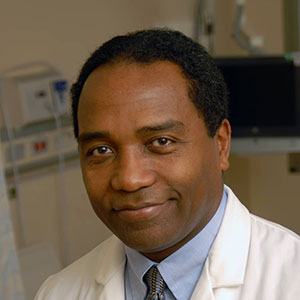Molecular & Clinical Hematology Branch
Branch Sections & Chiefs
-
Molecular Hematology Section
Griffin P. Rodgers, M.D., M.A.C.P. -
Cellular and Molecular Therapeutics Section
John Tisdale, M.D.
Molecular Hematology Section
Griffin P. Rodgers, M.D., M.A.C.P., Section Chief
Dr. Griffin P. Rodgers, director of the NIDDK, is also chief of the Molecular and Clinical Hematology Branch (MCHB) and Molecular Hematology Section. Research interests of this branch include planning and conducting research on the molecular and cellular bases of selected congenital and acquired hematological disorders; developing quantitative methods to express disease severity or activity, amenable to sequential applications; studying gene expression and differentiation in erythroid cells in normal and pathological hematopoietic states; studying the molecular basis of lineage-specific differentiation of hematopoietic stem cells; and developing therapies for hemoglobinopathies and other genetic blood disorders based on the modification of target gene expression.
Cellular and Molecular Therapeutics Section
John Tisdale, M.D., Section Chief
Dr. Tisdale’s section is researching multiple strategies in the laboratory and the clinic to cure sickle cell disease (SCD) by repairing or replacing the precursor bone marrow cells that give rise to sickled red blood cells. Bone marrow transplants from healthy donors are used successfully to treat certain blood cancers for which the course of the disease is so severe that the destruction of the patient’s own immune system through high-dose chemotherapy and radiation seems an effective compromise. However, the therapeutic balance in the case of SCD is less clear; children tolerate transplants more successfully, but they are also less imminently threatened by the disease. The success of conventional transplants in adults, whose need is more immediate, is less clear.
The issue of immune tolerance is, of course, central to transplantation research. Dr. Tisdale has an active research program in trying to characterize tolerance and create conditions in which patients will more easily tolerate donor cells and tissues without the need for destroying the immune system or perpetual use of immunosuppressant drugs. The program is also working on gene addition strategies that will harness the machinery of viruses to act as delivery vectors to provide a correct copy of the normal or a therapeutic gene to the patient's own bone marrow cells. Finally, his group is working to develop the means to ameliorate SCD by gene editing strategies aimed at either reactivating fetal hemoglobin through disrupting genes involved in fetal hemoglobin switching or correcting the underlying genetic mutation.
In addition, Dr. Tisdale leads other experts on transplantation immunology, regenerative therapies for inherited blood disorders, and early sickle mortality prevention as branch chief of the National Heart Lung and Blood Institute’s Cellular and Molecular Therapeutics Branch.


